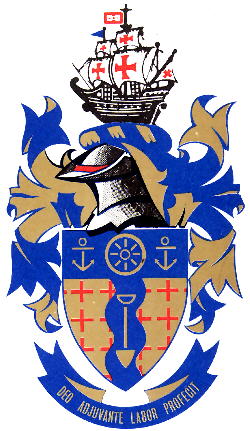Algoa
| Heraldry of the World Civic heraldry of South Africa |
ALGOA REGIONAL SERVICES COUNCIL / STREEKSDIENSTERAAD ALGOA
Province : Eastern Cape
Incorporated into : 1994 Western Region District Council
Official blazon
Arms: Or, semy of crosslets humetty gules, a pale wavy azure charged with a shovel or; upon a chief azure an eight-spoked wheel between two anchors or.
Crest: the caravel São Gabriel with sails set bearing the cross of the Order of Christ, the main mast bearing a banner of the arms of Portugal.
Mantling: Or and azure.
Motto: "Deo adjuvante labor profecit" (With the help of God we will profit
from our labour).
Origin/meaning
The field semy of crosslets symbolises the aim of Christian mission which underlay the exploratory journeys of the Portuguese Order of Christ, and the Christian character of modern South Africa. Vasco da Gama's 1497 journey aboard the São Gabriel was the first to reach Algoa Bay, where he planted a wooden cross on a small island now called St Croix or Santa Cruz island. He gave the bay a name meaning "Bay of the Rock", which was changed in Portugal to "Bahia de Lagoa" or Bay of the Lagoon, and which eventually became Algoa Bay. Da Gama also planted a stone cross or padrão at Kwaaihoek, just to the east of Algoa Bay, which also falls into the area of the ARSC.
The caravel was taken from the arms of the Dias Divisional Council. Unfortunately the banner on the main mast is shown in red and white only, whereas the cross-like emblem in the middle is in fact in blue and white, and the red border is semy of castles (see Portugal).
The crosslets, aside from their Christian symbolism, represent the council's health service, caring for the sick, injured and infirm, and for the ambulance service provided by the council.
The wavy pale represents the rivers in the region and the council's responsibility for water supply. The shovel symbolises road construction and maintenance, as well as honest labour.
The wheel represents progress, transport, traffic and roads.
The anchors are held to represent steadfastness and calm. These are the
only charges taken over from the arms of the City of Port Elizabeth; it is
ironic that the anchors (which in the city's arms are "proper" or in their
natural colours) were added last to the arms of Port Elizabeth as a mark of
difference from the arms of the city's founder, Sir Rufane Donkin. They
also symbolise the safe anchorage of Algoa Bay.
Literature : Information send by Mike Oettle (pmoettle@tmecl.co.za); Scan courtesy of East Cape Weekend.

